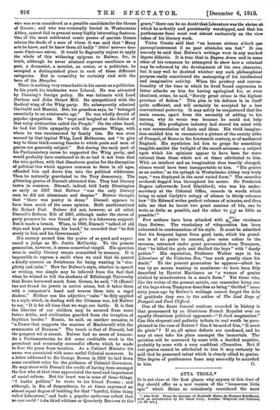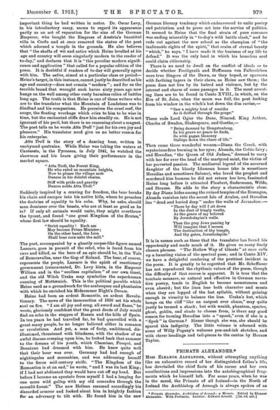ATTA TROLL.*
IT is not clear at the first glance why anyone at this time of day should offer us a new version of the "humorous little epic" which Heine . so mistakenly considered the most
• dila Troll. From the Gernian of Heinrich Heine, by Herman &heftier, with an introduction by Dr. Oscar Levy.. London kiidgwick and Jackson; [3s. ed. net.]
important thing he had written in metre. Dr. Oscar Levy, in his introductory essay, seems to regard its appearance partly as an act of reparation for the sins of the German Emperor, who bought the Empress of Austria's beautiful villa in Corfu and at once removed the statue of the poet which adorned a temple in the grounds. He also believes that "the shafts of wit and satire which Heine levelled at his age and country will seem singularly modern to the reader of to-day," and declares that it is "this peculiar modern signifi- cance and application" that called for a popular edition of the poem. It is doubtful if readers of to-day will generally agree with him. The satire, aimed at a particular class or period- Heine's target, in this instance, cannot justly be described as his age and country—does not remain " modern "; and for us the terrible brand that wrought such havoc sixty years ago now bangs on the wall among other rusty harmless relics of battles long ago. The truth is that Heine is one of those writers who are to the translator what the Mountain of Loadstone was to Sindbad and his companions. He perceives the cruel reef, the surge, the floating wreckage which cries to him to be wise in time, but the enchanted cliffs draw him steadily on. He is not
ignorant of his peril, but there is no reasoning about a magnet. The poet tells us he wrote Alta Troll "just for his own joy and
pleasure." His translator need give us no better reason for his enterprise.
Alta Troll is the story of a dancing bear, written in unrhymed quatrains. While Heine was taking the waters at
Cauterets, in the Pyrenees, in July 1841, he watched the showman and his bears giving their performance in the market square.
" Atta Troll, the Forest King,
He who ruled on mountain heights, Now to please the village mob Dances in his doleful chains.
Stiff with pride and gravity Dances noble Atta Troll."
Suddenly inspired by a craving for freedom, the bear breaks his chain and escapes into his native hills, where he preaches the doctrine of equality to his cubs. Why, he asks, should
man domineer over the beasts, who are at least as good as he is P If only all animals would unite, they might overthrow
the tyrant, and found "one great Kingdom of the Brutes," whose first law should be equality.
"Strict equality ! Each ass May become Prime Minister ; On the other hand, the Lion Shall bear corn unto the mill."
The poet, accompanied by a ghastly corpse-like figure named Lascaro, goes in pursuit of the rebel, who is lured from his cave and killed, as the hero of an epic should be, in the Vale of Roncesvalles, near the Gap of Roland. The bear, of course, represents the people, Lascaro is the spirit of reactionary government (reincarnated, Dr. Levy hints, in the Emperor William and in the "soulless capitalism" of our own time), and the old Witch Uraka may symbolize the superhuman cunning of Metternich. This is the political parable which Heine used as a groundwork for the arabesques and phantasies with which he enriched his Midsummer Night's Dream.
Heine had been an ardent Romantic, an ardent Revolu- tionary. The news of the insurrection of 1830 set his whole
soul on fire. "I am all joy and song, all sword and flame," he , wrote, gloriously confident that the great deeds of July would
find an echo in the steppes of Russia and the hills of Spain. In ten years he had travelled far, he had quarrelled with a great many people, he no longer believed either in romance or revolutions. And yet, a man of forty, embittered, dis- illusioned, threatened with blindness, with the shadow of an awful disease creeping upon him, he looked back that summer to the dreams of his youth, which Chamisso, Fouque, and
Breutano had dreamed with him. He knew quite well that their hour was over. Germany had had enough of nightingales and moonshine, and was addressing herself to the fierce mid-century strife. "The Kingdom of the Romantics is at an end," he wrote, "and I was its last King ; if I had not abdicated they would have cut off my bead. But before I became an apostate from myself I had a longing for one more wild gallop with my old comrades through the moonlit forest." The new Hellene resumed accordingly his discarded armour and looked about him in knightly fashion for an adversary to tilt with. He found him in the new
German literary tendency which endeavoured to unite poetry and patriotism and to press art into the service of politics. It seemed to Heins that the final strain of pure romance
was ending miserably in "to-day's wild battle clash," and he rode out against the new school as the champion of "the inalienable rights of the spirit," that realm of eternal beauty "which," he says, "1 have made it the business of my life to defend." It was the only land in which his homeless soul
could claim citizenship.
There is no need to dwell on the conflict of ideals or to decide whether Freiligrath and Hoffmann von Fallersleben were true Singers of the Dawn, as they hoped, or sparrows with farthing tapers in their claws, as Heine saw them ; the poem does not live by its hatred and violence, but by the interest and charm of some passages in it. The most arrest- ing lines are to be found in Canto XVIII., in which, on the Eve of St. John, when the moon was full, the poet looking from his window in the witch's hut down the dim ravine,—
" Saw a mighty host of wraiths As it drifted through the gorge."
There rode Lord Ogler the Dane, Nimrod. King Arthur, Charles of Sweden, Shakespeare, and Goethe,— " Being damned by Hengstenberg, In his grave no peace he finds, So with pagan blazonry
Gallops down the chase of life."
Then came three wonderful women—Diana the Greek, with mysterious fires burning in her eyes ; Abunda, the Celtic fairy ; and Herodias, "the Queen of Old Judaea," doomed to carry with her for ever the head of the martyred saint, the victim of her perverted passion. The mediaeval legend of the accursed daughter of the bloody Idumean house (she is sometimes Herodias and sometimes Salome), who loved the prophet and
murdered him because he did not return her love, fascinated Heine long before it attracted Flaubert, Sudermann, Wilde,
and Strauss. He adds to the story a characteristic close. By day Diana hides among the ruined temples of the Romagna, Abunda vanishes into the secret Isle of Avalon, and Herodias lies "dead and buried deep" under the walls of Jerusalem :-- "There by day will I sit down
In the dust of kingly vaults, At the grave of my beloved By Jerusholayim's walls.
Then the grey Jews passing by Will imagine that I mourn The destruction of thy temple, And thy gates, Jerusholayim."
It is in scenes such as these that the translator has found his opportunity and made much of it. He gives us many finely chosen phrases. "The Hollow Way of Ghosts" at once calls up a haunting vision of the spectral pass; and in Canto XIV. we have a delightful rendering of the prettiest incident in the poem. It is greatly to be regretted that Mr. Scheffauer has not reproduced the rhythmic values of the poem, though
the difficulty of that course is apparent. It is true that the trochaic measure, so natural and effective in German narra- tive poetry, tends in English to become monotonous and
even absurd; but the lines lose both character and music when they are lopped of the last syllable, without gaining enough in vivacity to balance the loss. Uraka's but, which hangs on the cliff "like an outpost over chaos," may quite
justly be termed a shack; but with wraith, phantom, spectre, ghost, goblin, and shade to choose from, is there any good reason for turning Herodias into a "spook," even if she is a " Spuk " in German P Sinner though she was, she should be spared this indignity. The little volume is adorned with some of Willy Pogany's welcome pen-and-ink sketches, and with clever headings and tail-pieces to the cantos by Horace Taylor,



































































 Previous page
Previous page